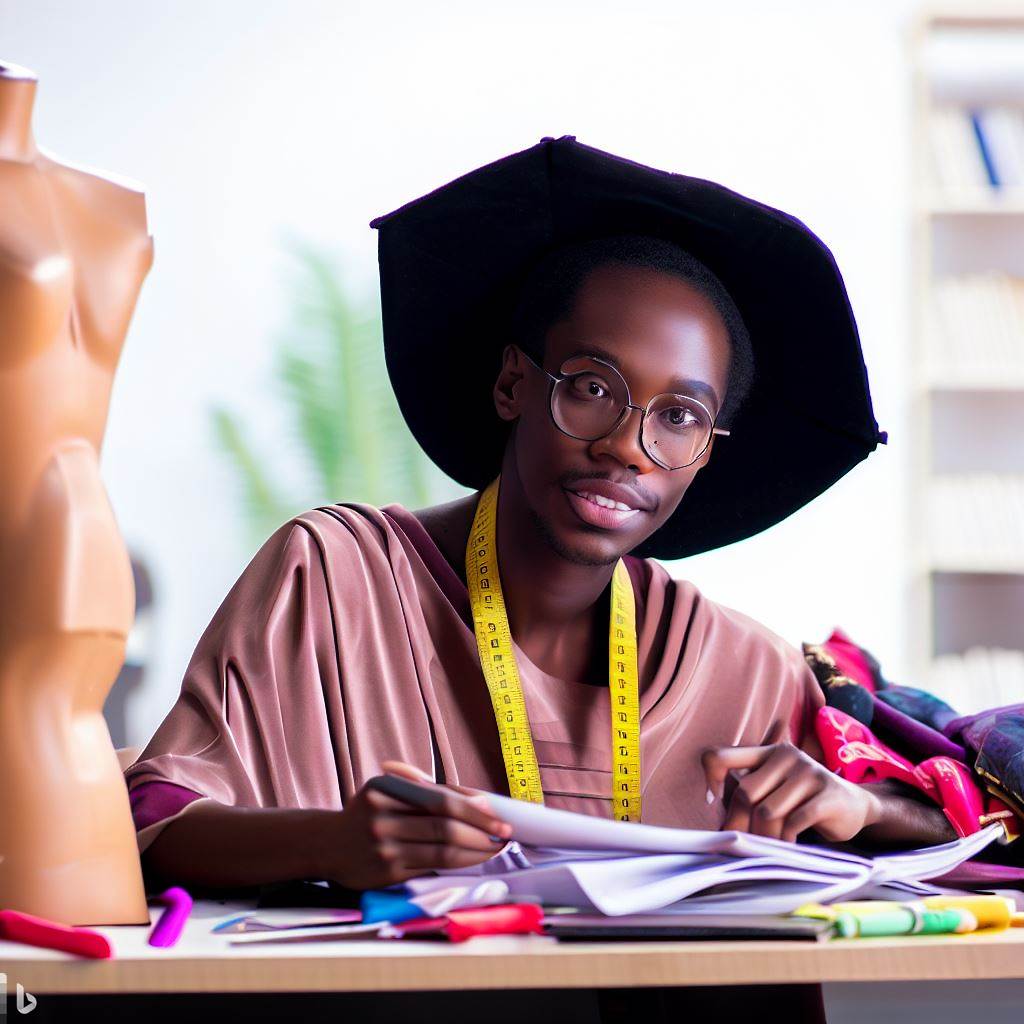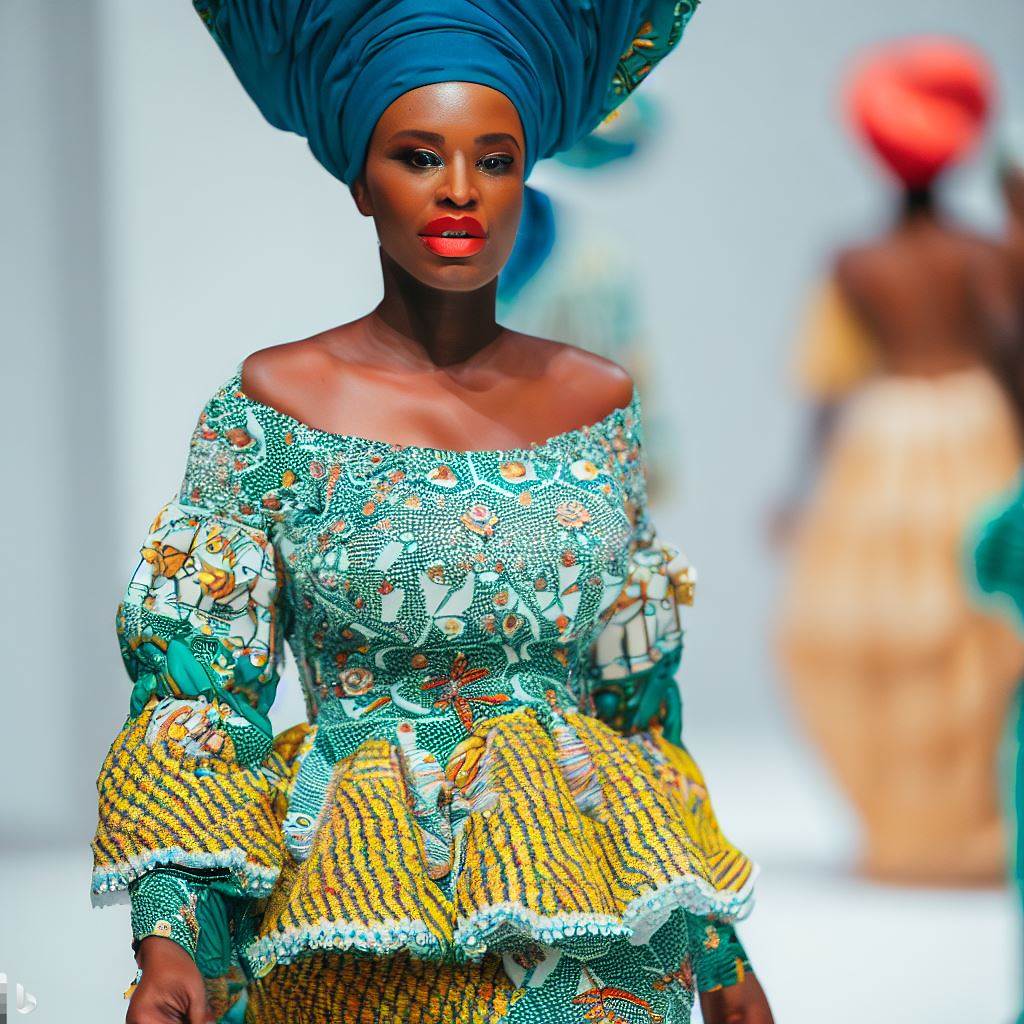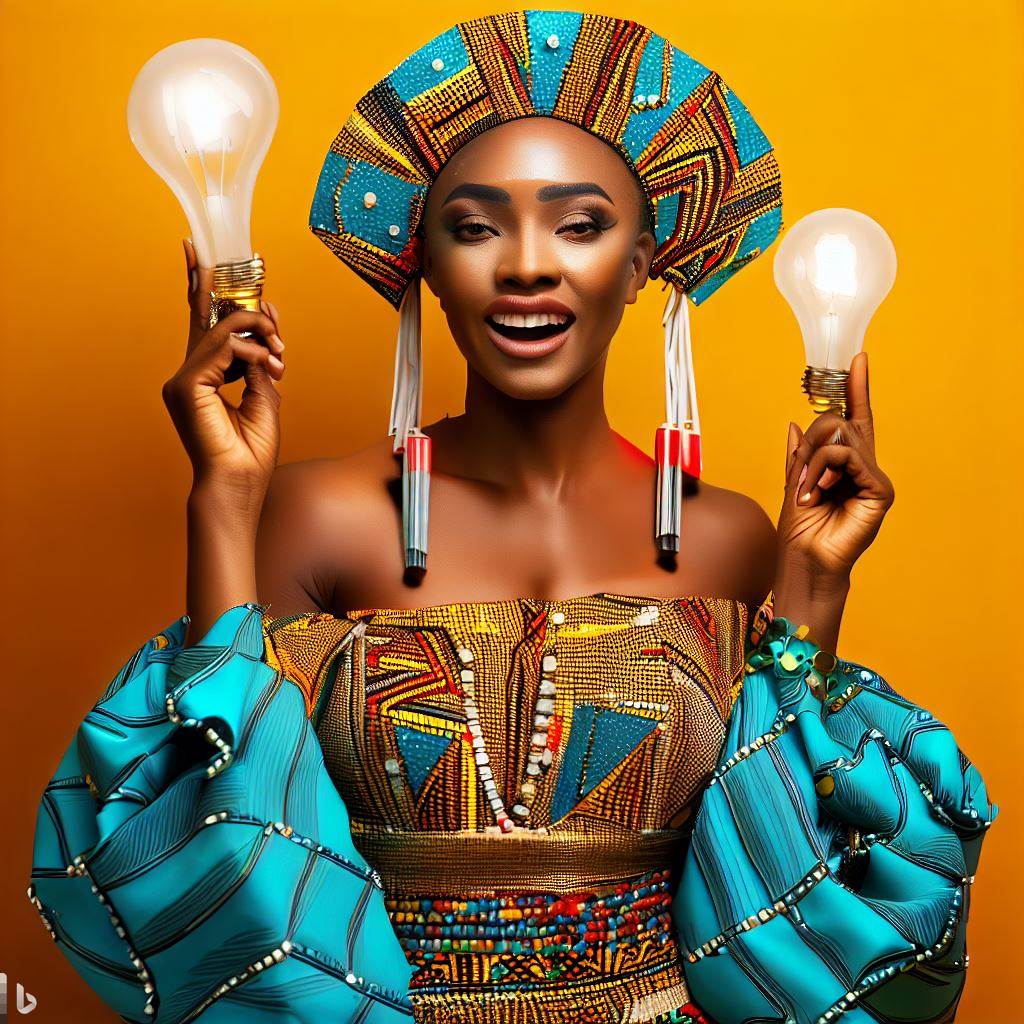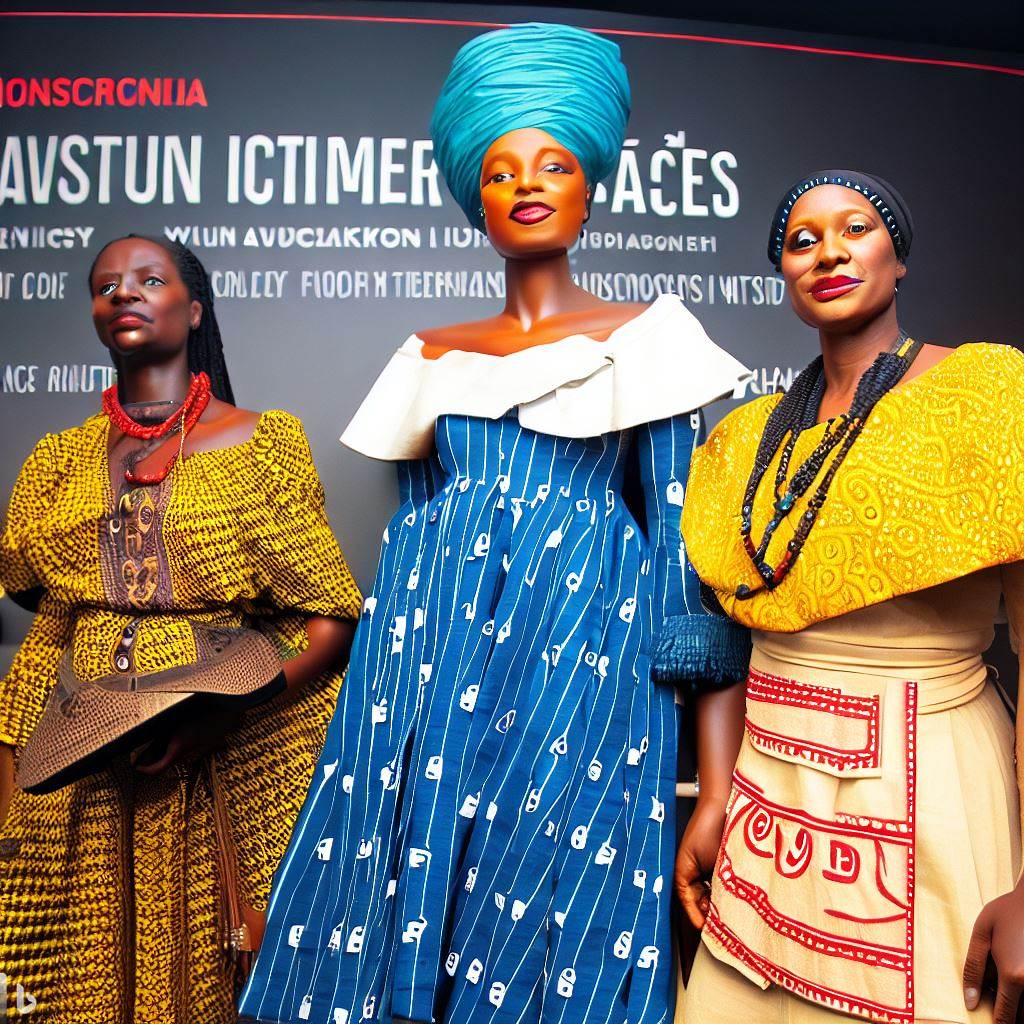Introduction
The costume design career educational pathway is a very interesting one for all aspiring costume designers.
To pursue a career in costume design in Nigeria, individuals can follow a structured educational pathway.
It typically involves obtaining a bachelor’s degree in fashion design or costume design from a reputable institution.
Students gain knowledge and skills in fashion history, textiles, pattern making, and costume construction.
Additionally, aspiring costume designers can benefit from internships, workshops, and collaborations with industry professionals.
These opportunities provide hands-on experience, networking opportunities, and a chance to build a portfolio.
Costume design plays a vital role in Nigeria’s entertainment industry, enhancing visual storytelling and character development.
Nigeria’s cultural richness enhances authenticity, representation, and aesthetics in film, theater, and TV through costume design.
In this blog section, we will delve into the necessary educational requirements, skills, and experiences that aspiring costume designers in Nigeria should pursue.
By understanding the educational pathway, individuals can equip themselves with the tools and knowledge needed to thrive in this exciting and vibrant industry.
High school education
Art subjects in secondary school that can provide a foundation for costume design
- Visual Arts
- Painting
- Drawing
- Sculpture
- Textile Design
These art subjects in secondary school can help students develop the necessary skills for a costume design career in Nigeria.
Visual Arts, painting, drawing, sculpture, and textile design all provide a foundation in creativity and artistic expression.
Importance of developing creative and artistic skills during high school
- Developing creative and artistic skills during high school is crucial for aspiring costume designers in Nigeria.
- It lays a strong foundation for their future career by enhancing their ability to envision and bring their design ideas to life.
- High school is a transformative period where students can explore and nurture their creative talents.
- It is the perfect time to experiment with various artistic mediums, learn different techniques, and develop a unique artistic style that will set them apart in the field of costume design.
Extracurricular activities in drama or theater arts that can contribute to costume design knowledge and experience
- Participating in school plays and musicals
- Joining drama or theater clubs
- Assisting in costume design and production for school productions
- Attending workshops and seminars on costume design
- Volunteering for local theater groups or productions
Extracurricular activities in drama or theater arts are invaluable for gaining practical knowledge and experience in costume design.
By participating in school plays and musicals, students can understand the importance of costumes in portraying characters and telling stories.
Joining drama clubs offers chances to collaborate, learn from pros, and explore costume design’s diverse facets.
Assisting in costume design and production for school productions allows students to apply their creative skills in a real-world setting.
Attending workshops and seminars on costume design provides exposure to industry professionals and the latest trends and techniques in the field.
Volunteering for local theater groups or productions offers hands-on experience and networking opportunities.
These activities enhance high school education, helping students build a valuable skill set and portfolio for a costume design career in Nigeria.
Read: Case Study: Influential Nigerian Costume Designers’ Journey
Undergraduate degree options
Bachelor’s degree programs in fashion design or costume design
List of universities or colleges in Nigeria with relevant programs
- University of Lagos
- Obafemi Awolowo University
- Ahmadu Bello University
- University of Nigeria, Nsukka
- University of Calabar
- University of Abuja
Overview of curriculum and courses offered
Bachelor’s degree programs in fashion design focus on providing students with a strong foundation in design principles, textile analysis, garment construction, and pattern making.
Additionally, these programs delve into the rich history of costumes to enhance students’ knowledge and skills in the field.
Courses may include:
- Introduction to Fashion Design
- Textile Science
- Garment Construction
- Pattern Making
- Costume History
- Computer-Aided Design for Fashion
Importance of research and selecting a reputable institution for quality education
Research is crucial when selecting an institution for a costume design program as it ensures the credibility, reputation, and resources of the institution.
A reputable institution provides quality education, industry connections, and opportunities for growth and internships.
Extracurricular activities or internships during undergraduate studies
Engaging in extracurricular activities and internships can greatly enhance practical skills in costume design.
Students can join fashion clubs or organizations, participate in fashion shows, attend workshops and seminars, and intern with professional costume designers or theatre companies.
These experiences provide hands-on learning, networking opportunities, and exposure to the industry.
Attaining a reputable Nigerian fashion or costume design Bachelor’s degree equips aspiring designers for successful careers.
Alongside the structured curriculum, students should actively engage in research, extracurricular activities, and internships to further develop their practical skills and industry connections.
Read: How Costume Design Contributes to Nigerian Film Narratives
Professional certifications and workshops
Overview of professional certification options in costume design
Earning professional certifications in costume design can enhance skills and knowledge in the field.
- Organizations like the International Costumers Guild offer certification programs for aspiring costume designers.
- These certifications validate expertise and can open doors to better career opportunities.
- Professional certifications often require passing exams and meeting specific criteria set by the certifying body.
- They provide recognition and credibility, distinguishing trained professionals from amateurs.
Importance of attending workshops and seminars to stay updated with industry trends and techniques
- Workshops and seminars offer valuable opportunities to learn new techniques and stay updated in the industry.
- Attending these events allows costume designers to network and collaborate with other professionals.
- Industry experts and guest speakers provide insights into emerging trends and cutting-edge techniques.
- Participating in workshops enhances practical skills and fosters creative thinking.
- Continuing education through workshops shows dedication to professional growth and development.
Local organizations or associations that offer such certifications and workshops
- The Nigerian Costumers Association (NCA) provides certification programs and workshops to aspiring costume designers.
- These programs cover various aspects of costume design, including garment construction, fabric manipulation, and historical research.
- The NCA also hosts seminars featuring renowned costume designers, helping participants stay updated with industry trends.
- Another organization, the Costume Society of Nigeria, offers certification courses and workshops in collaboration with renowned industry professionals.
- These programs focus on enhancing skills, fostering creativity, and nurturing a sense of professionalism in the costume design field.
In fact, obtaining professional certifications and attending workshops are crucial steps in building a successful costume design career in Nigeria.
These credentials demonstrate expertise and dedication, setting professionals apart in a competitive industry.
By staying updated with industry trends and techniques, costume designers can continually improve their skills and provide innovative designs.
Nigerian organizations like the Nigerian Costumers Association and Costume Society offer vital certification programs, aiding aspiring designers’ career growth.
Read: Influence of Nigerian Textiles in Costume Design

Industry experience
Importance of gaining practical experience through internships or apprenticeships
- Practical experience is vital in the costume design industry as it allows individuals to apply their theoretical knowledge.
- Internships and apprenticeships provide valuable hands-on training and help develop important technical skills.
- Through these programs, aspiring costume designers can learn from professionals and gain insight into the industry.
- Practical experience also allows individuals to build a portfolio of their work, showcasing their skills to potential employers.
Networking and building relationships within the industry for better job prospects
Networking plays a crucial role in establishing connections and finding job opportunities in the costume design field.
- Attending industry events, workshops, and conferences allows individuals to meet professionals working in the industry.
- Building relationships with costume designers, stylists, and other industry insiders can lead to job recommendations and collaborations.
- Maintaining an active online presence and engaging with industry communities can also expand networking opportunities.
Examples of notable Nigerian costume designers and their career trajectories
- Deborah Odeyemi: Started as a costume assistant and worked her way up to become a renowned costume designer for Nollywood films.
- Dimeji Ajibola: Began his career as a tailor and gradually transitioned into costume designing for Nigerian theater productions.
- Uche Nancy: Initially worked as a fashion designer but later switched to costume designing, gaining recognition for her unique style.
- Yolanda Okereke: Started as a wardrobe assistant and eventually established herself as a successful costume designer, known for her attention to detail.
Gaining industry experience, whether through internships, apprenticeships, or networking, is crucial for aspiring costume designers in Nigeria.
It helps individuals develop practical skills, build connections, and learn from established industry professionals.
By studying the career trajectories of notable Nigerian costume designers aspiring costume designers can draw inspiration and insights into their own paths.
With determination, hard work, and the right industry experience, anyone can pursue a successful costume design career in Nigeria.
Explore Further: Finding Clients as an Interior Decorator in Nigeria: A Guide
Building a portfolio
The importance of developing a strong portfolio to showcase skills and creativity
- As a costume designer, your portfolio is your passport to success. It’s a visual testament to your skills and creativity.
- A well-curated portfolio speaks volumes, showcasing your ability to bring characters to life through clothing.
- Highlighting diverse projects and styles within your portfolio demonstrates your versatility.
- Clients can quickly assess your suitability for their project, making a compelling portfolio a powerful marketing tool.
- In a competitive field like costume design, a strong portfolio is your secret weapon for standing out and succeeding.
Tips for creating an impressive costume design portfolio
- Begin with your best work – make a strong first impression to grab your viewer’s attention instantly.
- Showcase a variety of projects, demonstrating your versatility as a costume designer.
- Organize your portfolio logically, allowing viewers to navigate effortlessly through your creations.
- Highlight your creative process by including concept sketches, fabric swatches, and mood boards.
- Include professional-quality, high-resolution images to capture the intricate details of your designs.
- Update your portfolio regularly to reflect your growth and latest accomplishments.
- Seek feedback from peers and mentors to fine-tune your portfolio’s presentation.
- Tailor your portfolio to your target audience, whether it’s clients, employers, or schools.
Types of projects or productions to include in the portfolio
- Theater productions: Showcase your stage costume design expertise.
- Film projects: Highlight your skills in cinematic costume storytelling.
- TV shows: Display versatility for ongoing series.
- Short films: Prove efficiency in quick, impactful costume work.
- Commercials: Capture diverse brand aesthetics.
- Historical dramas: Exhibit attention to detail and historical accuracy.
- Sci-fi/fantasy: Flaunt imaginative, otherworldly costume creations.
- Fashion shows: Display avant-garde and runway-ready designs.
- Personal projects: Reveal your unique vision and collaborations.
In short, building a strong portfolio is essential for aspiring costume designers in Nigeria.
A well-curated portfolio enhances job prospects and career growth by showcasing skills and creativity effectively.
Costume designers can showcase versatility and adaptability by following these tips and including diverse projects in their portfolio.
Whether it’s for stage productions, film, animation, or fashion events, a compelling portfolio will leave a lasting impression on potential employers or clients.
So, aspiring costume designers should invest time and effort into developing a portfolio that truly reflects their talents and capabilities.
Read: Showcasing Nigerian Identity through Costume Design
Job opportunities in costume design
Overview of career prospects and potential job roles
Costume designers have a world of possibilities awaiting them. They craft outfits for theater, film, and TV productions.
In theater, they create stunning costumes that help actors transform into characters. Film costume designers work on movies, ensuring costumes match the director’s vision.
TV series rely on costume designers to maintain character consistency throughout episodes. Fashion designers create stylish clothing for the runway and everyday wear.
Costume supervisors oversee costume departments, ensuring everything runs smoothly. Costume design educators share their knowledge with aspiring designers.
These diverse roles in costume design offer exciting career paths for creative individuals with a passion for fashion.
Growing demand for costume designers in Nigeria’s entertainment industry
Nigeria’s entertainment industry is booming, and costume designers are in high demand. They craft captivating outfits for actors.
- In Nollywood, costume designers create authentic looks for the diverse characters in Nigerian films.
- The music industry also seeks their expertise for music videos, concerts, and album covers.
- Fashion designers collaborate with musicians and actors to create signature styles.
- With the industry’s growth, costume designers play a crucial role in shaping Nigeria’s entertainment landscape.
- Their creative talents are indispensable, reflecting the vibrant culture and rich storytelling of this dynamic industry.
Possible work environments, such as film, theater, events, or fashion
Costume designers thrive in diverse settings.
- They create iconic looks for characters in film productions.
- In theater, they bring stories to life through the art of costume design.
- Special events call for imaginative costumes, from extravagant parties to historical reenactments.
- Fashion designers craft trendy clothing for runways, retail, and individual clients.
These varied work environments offer costume designers exciting opportunities to showcase their creativity and talent.
Costume design offers a wide range of job opportunities in Nigeria’s entertainment industry.
As the industry continues to grow, more opportunities are becoming available for talented and passionate costume designers.
Conclusion
Aspiring costume designers in Nigeria can start by obtaining a high school diploma followed by a bachelor’s degree in fashion or costume design.
They can then gain practical experience through internships or apprenticeships and further their skills through workshops and short courses.
Finally, joining professional associations and networks can help them stay updated with industry trends and opportunities.
To all aspiring costume designers in Nigeria, I encourage you to pursue your passion wholeheartedly.
The path may not always be easy, but with determination and hard work, you can overcome any obstacles. Be persistent and never give up on your dreams.
The impact of costume design on Nigeria’s entertainment industry cannot be overstated.
It plays a crucial role in bringing characters to life, setting the mood, and enhancing the overall visual experience.
With the industry’s exponential growth, the demand for skilled costume designers will continue to rise.
This presents a great opportunity for aspiring designers to contribute to the industry’s growth and make a name for themselves.




